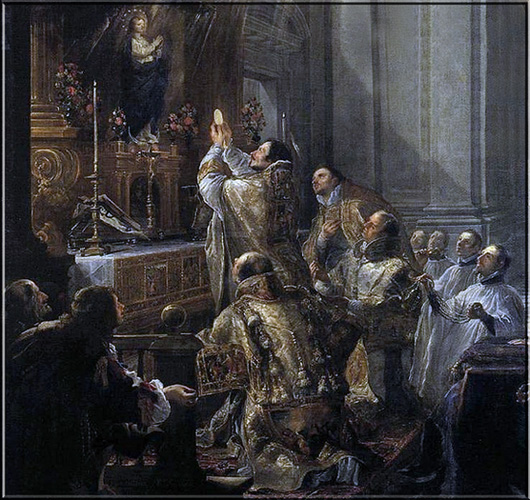
|
THE HOLY SACRIFICE OF THE MASS by Fr. O' Keeffe, 1891 "Christ also hath loved us, and hath delivered Himself for us, an oblation and a sacrifice to God for an odor of sweetness."--Ephes. v. 2.
The Catholic Church, my brethren, speaking through the Council of Trent, as through a mouthpiece, commands her preachers, and all others having the care of souls, to explain the Holy Sacrifice of the Mass to their people carefully and frequently. Our good Mother, the Church, has made this law, my dear Christians, to the end that we may all know what a great treasure God has left to us in this sublime Sacrifice of the Altar, and what great advantages we may derive from a faithful and devout attendance thereat. The same sweet love for men which pressed our Lord Jesus Christ, in the first instance, to institute this adorable Sacrifice of the New Law, presses Him, also, to desire that its transcendent nature and effects should be made known to the whole world as fully and as clearly as possible. The Sacrifice of the Mass is by far the richest treasure which Christ has left to His Church. Yet, my brethren, there are many persons who treat it with indifference, and take little or no pains to rightly understand its value, or the manifold graces and blessings which it contains. Strange to say, while the great mass of Catholics frequently meditate upon the infinite love of Jesus Christ in instituting the Blessed Eucharist as a Sacrament, comparatively few ever reflect upon His equally infinite love in instituting it, also as a Sacrifice.
ON THE ENDS FOR WHICH MASS IS OFFEREDBy sacrifice is meant: the external offering to God alone, of some sensible or visible thing, made by a priest, or lawful minister; the partial destruction or total annihilation of the victim being the acknowledgment of Almighty God's supreme dominion over us, and our total dependence on Him. Christian sacrifice cannot be offered to any one but to God alone. The strongest instincts of nature, my brethren, prompt us to offer sacrifice to the Deity as an essential and acceptable act of religion. Hence, from the commencement of the world, all nations, even the most barbarous and illiterate, have offered sacrifice of one kind or another to the divinities they worshipped. In the Old Law sacrifices of divers kinds were frequently offered to God. Abel offered sacrifice of "the firstlings of his flock" (Gen. iv.); Noah "built an altar unto the Lord: and taking of all cattle and fowls that were clean, offered holocausts upon the altar" (Gen. vii.); 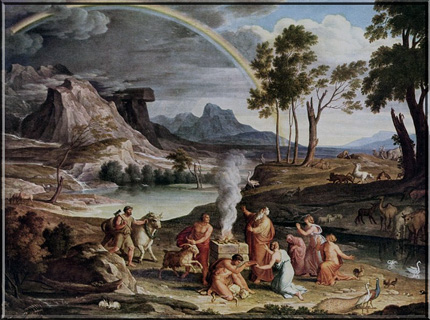
The sacrifices of the Old Law were, some of them, bloody; others unbloody. The bloody sacrifices consisted chiefly of lambs, oxen, and goats. Sometimes, as in the case of our Lord's presentation, the victims were birds: "They carried him to Jerusalem to present him to the Lord. . . . . And to offer sacrifice, according as it is written in the Law of the Lord, a pair of turtle-doves or two young pigeons" (Luke ii. 22 - 24). The unbloody sacrifices were mainly of flour, and wine, and oil, etc. These ancient sacrifices, though offered up by the hands of the holy Patriarchs, had no intrinsic value of their own. They were but poor and weak elements, quite incapable of cancelling sin, quite incapable of conferring God's grace upon those who offered them, or upon those for whom they were offered. "For it is impossible," says St. Paul, "that with the blood of oxen and goats, sins should be taken away" (Heb. x. 4). Those sacrifices were but mere types and figures of the true Sacrifice yet to come--that is, of the holy Mass--and it was only as such that they were in any sense acceptable to God. Compared with the Sacrifice of the Mass, they were but as vague shadows, compared to the solid substance. II. But, at length, the shadows and symbols have given place to the sublime reality. Moved by an incomparable love for fallen man, the eternal Word of God descended from heaven, was made flesh, and dwelt amongst us. He came to offer Himself in sacrifice for our redemption. And, in that eventful hour, all the ancient sacrifices were forever abolished. In view of that divine Victim, they became displeasing (rather than pleasing) to God; the only sacrifice He would consent to accept as worthy of Him was that of His Eternal Son. Our Lord Jesus Christ speaking to His Heavenly Father on this subject, says: "Sacrifices and oblations, and holocausts for sin Thou wouldst not, neither are they pleasing to Thee which are offered according to the (Old) Law. Then, said I: Behold, I come to do Thy Will, O God." According to these words, St. Paul says: "Christ taketh away the first (or ancient sacrifices) that He may establish that which followeth (that is, the Sacrifice of the Mass). By the which will, we are sanctified by the oblation of the body of Jesus Christ" (Heb. x. 8--11). The Mass, my beloved brethren, is the Sacrifice of the Body and Blood of Jesus Christ, which are really present upon our altars under the appearance of bread and wine, and are offered to God by the priest for the living and the dead. This sublime oblation is no new sacrifice in the Catholic Church. The testimony of the holy Fathers, the sacred archives of antiquity, furnish abundant records and proofs of its existence in the Church, since the days of Christ and His Apostles. Nor, indeed, for more than fifteen hundred years, was there found one bold or bad enough to deny it, until Martin Luther, of dismal and execrable memory, raised his heretical voice against it in the sixteenth century, and thus deprived himself, and millions besides, of the many graces purchased for them by the Sacrifice of the cross, and made applicable to them by Christ through the Sacrifice of the Mass. The latter was clearly foretold by the Prophet Malachy, when he declares to the Jews, as the mouth-piece of the Most High (I, x. 11): "I have no pleasure in you, saith the Lord of Hosts. I will not receive a gift of your hand. For, from the rising of the sun even to the going down, my name is great among the Gentiles, and in every place there is sacrifice, and there is offered to my name a clean oblation." From this passage, my dear Christians, we see that, from the period of our Lord's Crucifixion, the sacrifices of the Jews were rejected; that a clean oblation was instituted in their stead; and that this clean oblation was offered to His name among the Gentiles throughout the whole world, from the rising of the sun to the going down thereof. This, we know for a certianty, since the words of the Prophet apply with striking force and exactness to the holy Sacrifice of the Mass, and not to any other sacrifice on the face of the earth; not to the sacrifices of the Jews, for God expressly declares, through Malachy, that He would not receive a gift from their hands; nor to the Sacrifice of the Cross, for that was offered up in only one place, and not "in every place." In a word, the Prophet's description does not correspond with any sacrifice but the adorable Sacrifice of our altars, which is verily "a clean oblation, offered up in every place, from the rising of the sun to the going down of the same." Again, my brethren, the royal Psalmist calls Jesus Christ a priest forever, according to the order of Melchisedech. Now, you must understand that Melchisedech was a mysterious priest and king of the Old Law, who offered sacrifice to God, only under the form of bread and wine. 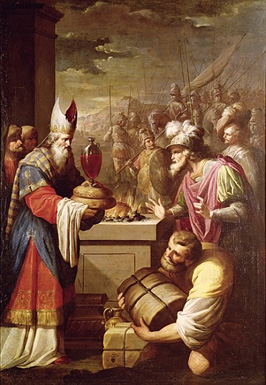 "If, then, perfection was by the Levitical priesthood," says St. Paul, "(for under it the people received the law), what further need was there that another priest should rise according to the order of Melchisedech, and not be called according to the order of Aaron? . . . . For he, of of whom these things are spoken, is of another tribe, of which no one attendeth at the altar. For it is evident, that our Lord sprung out of Juda, in which tribe Moses spoke nothing concerning priests. And it is, yet, far more evident if, according to the similitude of Melchisedech, there ariseth another priest, who is made, not according to a carnal commandment, but according to the power of an indissoluble life; for he testifieth : Thou are a priest forever according to the order of Melchisedech" (Heb. vii. 11-18). The application of this passage to the Holy Sacrifice of the Mass is so obvious, my brethren, that it scarcely needs a word of further comment; for, in the Mass, Christ shall invisibly be offered up in the Sacrifice forever; and shall, furthermore, invariably offer Himself to the Eternal Father, therein, according to the order of Melchisedech, that is, under the form of bread and wine (Ps. xix. 9). But, let us even suppose that there were no Sacrifice of the Mass, and that (as some non-Catholics maintain) the Psalmist referred in his remarkable prophecy exclusively to our Lord's Sacrifice upon the Cross, do you not see that Christ could not be rigidly called "a priest forever" upon Mount Calvary, inasmuch as the Sacrifice of the Cross was offered by Him only once, and in one place? Do you not see, also, that He could not there be declared "a priest forever, according to the order of Melchisedech," inasmuch as the Sacrifice of Mount Calvary was not offered according to the order of Melchisedech at all, not offered under the form of bread and wine, but according to the order of Aaron, that is, in a bloody manner?
"If, then, perfection was by the Levitical priesthood," says St. Paul, "(for under it the people received the law), what further need was there that another priest should rise according to the order of Melchisedech, and not be called according to the order of Aaron? . . . . For he, of of whom these things are spoken, is of another tribe, of which no one attendeth at the altar. For it is evident, that our Lord sprung out of Juda, in which tribe Moses spoke nothing concerning priests. And it is, yet, far more evident if, according to the similitude of Melchisedech, there ariseth another priest, who is made, not according to a carnal commandment, but according to the power of an indissoluble life; for he testifieth : Thou are a priest forever according to the order of Melchisedech" (Heb. vii. 11-18). The application of this passage to the Holy Sacrifice of the Mass is so obvious, my brethren, that it scarcely needs a word of further comment; for, in the Mass, Christ shall invisibly be offered up in the Sacrifice forever; and shall, furthermore, invariably offer Himself to the Eternal Father, therein, according to the order of Melchisedech, that is, under the form of bread and wine (Ps. xix. 9). But, let us even suppose that there were no Sacrifice of the Mass, and that (as some non-Catholics maintain) the Psalmist referred in his remarkable prophecy exclusively to our Lord's Sacrifice upon the Cross, do you not see that Christ could not be rigidly called "a priest forever" upon Mount Calvary, inasmuch as the Sacrifice of the Cross was offered by Him only once, and in one place? Do you not see, also, that He could not there be declared "a priest forever, according to the order of Melchisedech," inasmuch as the Sacrifice of Mount Calvary was not offered according to the order of Melchisedech at all, not offered under the form of bread and wine, but according to the order of Aaron, that is, in a bloody manner?In the New Testament, too, we find clear and abundant proofs of the Catholic doctrine, respecting the Sacrifice of the Mass. St. Matthew (xxvi. 26), describing the Last Supper, states that Jesus Christ "took bread, and blessed, and broke, and gave it to His disciples: and said "Take ye and eat: this is my body. And taking the chalice, He gave thanks, and gave to them, saying: Drink ye all of this, for this is my blood!" Here, we see, dear brethren, that Jesus offered Himself in sacrifice; His blood was represented as separated from His body. Thus, it was mystically shed, though not actually shed, for the actual blood-shedding took place afterward, when He expired on the Cross. This change in the victim--namely, the body represented under one form, and the blood under another, and both thus apparently separated, one from the other, shows forth most strikingly the death of our Saviour: "the Lamb is, as it were, slain" (Apoc. v. 6). 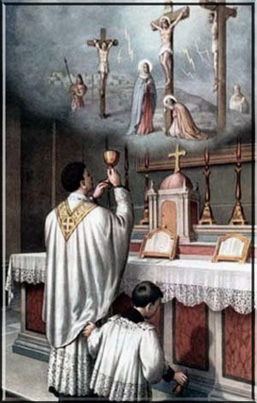 This same Sacramental separation, namely, the Body of Christ, under the form of bread, and the Blood, under the form of wine, may be rightly said to constitute a sacrifice, and, in reality, the Sacrifice of the Mass; or, in other words, it is the Sacrifice of the Cross is an unbloody form, together with the real infinite merits of the same, applied according to the intention of the person who offers it. By giving us the Sacrifice of the Mass, Jesus Christ has lovingly put into our hands the golden master-key by which to possess ourselves of the infinite merits which He purchased for us by the Sacrifice of the Cross, and which He has left carefully locked up therein (as in a divine treasurehouse), for our use and benefit. Hence the Mass is the real application of the fruits of the Sacrifice of the Cross, as well as the unbloody repetition of that same sacrifice.
"We, therefore, confess," says the Council of Trent, "that the Sacrifice of the Mass is, and ought to be, considered one and the same as that of the Cross, as the victim is one and the same, namely, Christ our Lord, who immolated Himself, once only, after a bloody manner, on the altar of the Cross. For the bloody and unbloody Victim are not two victims, but one only, whose sacrifice is daily renewed in the Eucharist, in obedience to the command of the Lord: 'Do this for a commemoration of me' (Luke xxii. 19)." This same Sacramental separation, namely, the Body of Christ, under the form of bread, and the Blood, under the form of wine, may be rightly said to constitute a sacrifice, and, in reality, the Sacrifice of the Mass; or, in other words, it is the Sacrifice of the Cross is an unbloody form, together with the real infinite merits of the same, applied according to the intention of the person who offers it. By giving us the Sacrifice of the Mass, Jesus Christ has lovingly put into our hands the golden master-key by which to possess ourselves of the infinite merits which He purchased for us by the Sacrifice of the Cross, and which He has left carefully locked up therein (as in a divine treasurehouse), for our use and benefit. Hence the Mass is the real application of the fruits of the Sacrifice of the Cross, as well as the unbloody repetition of that same sacrifice.
"We, therefore, confess," says the Council of Trent, "that the Sacrifice of the Mass is, and ought to be, considered one and the same as that of the Cross, as the victim is one and the same, namely, Christ our Lord, who immolated Himself, once only, after a bloody manner, on the altar of the Cross. For the bloody and unbloody Victim are not two victims, but one only, whose sacrifice is daily renewed in the Eucharist, in obedience to the command of the Lord: 'Do this for a commemoration of me' (Luke xxii. 19)." In every Mass of our altars, dear brethren, the same Christ is, therefore, contained and immolated in an unbloody manner, who once offered Himself in a bloody manner on the altar of the Cross. For the Victim is one and the same, now offering Himself by the ministry of His priests (C. of Trent). 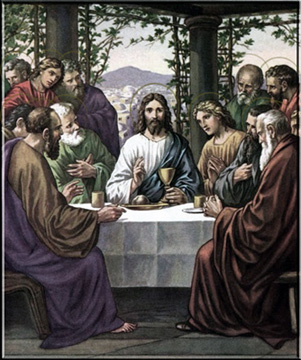 You see, then, that it was our Lord Jesus Christ who offered up the first Mass, on the eve of His bitter Passion and Death; and it is He, also, who offers up every Mass; for the priest who outwardly offers it is only the visible minister of Christ; Christ Himself, is the Invisible Priest and Victim. Wherefore, the Mass is the original, the self-same Sacrifice as that of the Cross, only differing from the latter in the manner of its oblation. When our Divine Lord had celebrated His First Mass at His Last Supper He gave power and command to His twelve Apostles, present with Him on that occasion, and to all their lawful successors--that is, the priests of the Catholic Church, to offer up the same sublime Sacrifice until the end of the world. " Do this," said He, "for a commemoration of me" (Luke xxii. 19). Hence it is, that in the Mass, the priests take bread and wine, and by virtue of the power of Christ, given unto them at their ordination, they change the whole substance of the bread into the Body of Christ, and the whole substance of the wine into His Blood; and no part or atom of either substance remains (Con. of Trent; Sess. xiii. 2). The species, however, of both the bread and wine remain unchanged; and this is ordained by our Lord not only to exercise our faith, but also in order to veil the dazzling splendors of His Divinity, which no mortal man can see and live. In every Mass, the priest acts in the name of Christ, and uses the words of Christ. Hence the words used at the moment of Transubstantiation, are: "This is my Body--this is my Blood." And whilst the priest thus outwardly offers the Sacrifice of the Mass, it is Christ Himself who really and invisibly offers it through His chosen minister. Jesus Christ then is (as we have already said) both Priest and Victim in this "clean oblation," foretold by the Prophet Malachy, and the same He shall continue to be in each and every Mass that is or will be offered until the end of the world.
You see, then, that it was our Lord Jesus Christ who offered up the first Mass, on the eve of His bitter Passion and Death; and it is He, also, who offers up every Mass; for the priest who outwardly offers it is only the visible minister of Christ; Christ Himself, is the Invisible Priest and Victim. Wherefore, the Mass is the original, the self-same Sacrifice as that of the Cross, only differing from the latter in the manner of its oblation. When our Divine Lord had celebrated His First Mass at His Last Supper He gave power and command to His twelve Apostles, present with Him on that occasion, and to all their lawful successors--that is, the priests of the Catholic Church, to offer up the same sublime Sacrifice until the end of the world. " Do this," said He, "for a commemoration of me" (Luke xxii. 19). Hence it is, that in the Mass, the priests take bread and wine, and by virtue of the power of Christ, given unto them at their ordination, they change the whole substance of the bread into the Body of Christ, and the whole substance of the wine into His Blood; and no part or atom of either substance remains (Con. of Trent; Sess. xiii. 2). The species, however, of both the bread and wine remain unchanged; and this is ordained by our Lord not only to exercise our faith, but also in order to veil the dazzling splendors of His Divinity, which no mortal man can see and live. In every Mass, the priest acts in the name of Christ, and uses the words of Christ. Hence the words used at the moment of Transubstantiation, are: "This is my Body--this is my Blood." And whilst the priest thus outwardly offers the Sacrifice of the Mass, it is Christ Himself who really and invisibly offers it through His chosen minister. Jesus Christ then is (as we have already said) both Priest and Victim in this "clean oblation," foretold by the Prophet Malachy, and the same He shall continue to be in each and every Mass that is or will be offered until the end of the world.Oh, my brethren, how shall we return due praise to God for thus deigning to become incarnate, day by day, in the hands of His priests, as He did once in the chaste womb of the Blessed Virgin Mary! How grateful we ought to be for having the Mass celebrated in every land all the world over. Wherever we go, we find ourselves at home. "Do this for a commemoration of me."--LUKE xxii. 19. The Sacrifice of the Mass, my beloved brethren, is offered up for four great ends:
1. To give fitting, or, in other words, infinite praise and honor to Almighty God.
(a) The natural law, written in the heart of man, directs that every inferior should pay homage to his superior; and, futhermore, that this homage should be always in proportion to the rank and dignity of the superior. Now, this being the case, we should pay to Almighty God, as the Supreme Creator and Ruler of the universe, as our first Beginning and our last End, infinite praise, infinite honor. Anything short of the infinite would not be sufficient, nor would it be adequately worthy of His acceptance. But, since all our human offerings, all our human acts, are, like ourselves, finite, how can we offer any infinite gift to our good and merciful God?
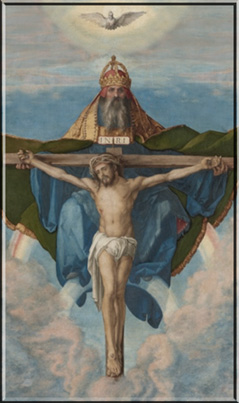 If all the creatures of this world, no matter how rich, or beautiful, or delightful they might be in themselves, were brought to the feet of Almighty God, and laid there as an offering, they would not be worthy His acceptance; for there is nothing worthy of God's acceptance except God Himself. Jesus Christ, then, seeing this great want on the part of man, has, in a marvellous excess of divine love, supplied it by offering Himself, a God of infinite worth, to His Eternal Father in the Sacrifice of the Mass. In that Holy Sacrifice, dear Christians, we can give infinite praise and honor to God, by uniting ourselves to the offering made to Him on our altars by the consecrated hands of His priest. Nay, more, by every Mass that we offer, or get the priest to offer for us, by every Mass at which we assist, we can co-operate in the great sacrifice of Jesus Christ in our behalf; for, thereby discharging our first and chief duty to God, we acknowledge our total dependence on Him, and return Him fitting praise and honor. The accumulated worship of the Saints and Angels in Paradise, of the Archangels, the Seraphim, the Thrones, the Dominations, and the Powers, is unspeakingly grand and pleasing to Almighty God; but it is, as it were, nothing in comparison with the praise and honor given to Him by a single Mass celebrated by a poor, obscure priest in some hidden corner of this lower world. For the praise of all those celestial beings, great though it be, is only finite, whereas the praise given by a Mass is infinite!
If all the creatures of this world, no matter how rich, or beautiful, or delightful they might be in themselves, were brought to the feet of Almighty God, and laid there as an offering, they would not be worthy His acceptance; for there is nothing worthy of God's acceptance except God Himself. Jesus Christ, then, seeing this great want on the part of man, has, in a marvellous excess of divine love, supplied it by offering Himself, a God of infinite worth, to His Eternal Father in the Sacrifice of the Mass. In that Holy Sacrifice, dear Christians, we can give infinite praise and honor to God, by uniting ourselves to the offering made to Him on our altars by the consecrated hands of His priest. Nay, more, by every Mass that we offer, or get the priest to offer for us, by every Mass at which we assist, we can co-operate in the great sacrifice of Jesus Christ in our behalf; for, thereby discharging our first and chief duty to God, we acknowledge our total dependence on Him, and return Him fitting praise and honor. The accumulated worship of the Saints and Angels in Paradise, of the Archangels, the Seraphim, the Thrones, the Dominations, and the Powers, is unspeakingly grand and pleasing to Almighty God; but it is, as it were, nothing in comparison with the praise and honor given to Him by a single Mass celebrated by a poor, obscure priest in some hidden corner of this lower world. For the praise of all those celestial beings, great though it be, is only finite, whereas the praise given by a Mass is infinite!(b) The second great end for which we offer up the Sacrifice of the Mass, is to make infinite satisfaction to God for the sins of His creatures. Happily, my beloved brethren, we can all make sufficient satisfaction to God for our sins by this sublime Sacrifice of the altar; and by this Sacrifice alone. For, as the Sacrifice of the Cross satisfied the Divine Justice for the sins of the world, so the Sacrifice of the Mass, and it alone, satisfies for the sins of those who offer it, or cause it to be offered. And this it does, by applying to each of our needy souls the infinite merits purchased by the Sacrifice of the Cross for mankind in general. But here it must be carefully understood that the Mass does not satisfy for our mortal sins immediately; it does not immediately cancel such sins, as the Sacrament of Penance does, when properly received. It cancels them only mediately, that is, it gives us actual graces and helps, whereby our souls may be freed from their guilt at an early and convenient time. And thus, by the Sacrifice of the altar, dear Christians, the graces and merits, purchased by our Lord on Calvary for mankind in general, are communicated to the individual souls for whom the Mass is offered. Who, then, can estimate the value or importance of having Masses offered for your intention, or in behalf of the sinner? Who can enumerate the benefits to be derived from frequent assistance at this adorable Sacrifice, offering it up with the intentions of the priest? Who can adequately describe the consoling clemency which God extends to us on account of the Sacrifice of the Mass! "The Holy Sacrifice of the Mass," says St. Leonard of Port Maurice, "is the true and sole reason of such stupendous clemency, for in it we offer to the Eternal Father the Great Victim, Jesus Christ. This is the sun of our Holy Church, which dissipates the clouds and restores serenity to the heavens. This, indeed, is the celestial rainbow that stills the tempest of the Divine Justice. For my own part, I am persuaded that, if it were not for the Holy Mass, the world would have long since tottered from its foundations, crushed beneath the enormous weight of so many accumulated iniquities. The Mass is the ponderous and powerful supporter on which the world rests--which keeps it from falling into horrid chaos. . . . . Ah, indeed, if it were not for this Holy Victim (Jesus Christ), once offered for us on the cross, and now daily offered on our altars, we, one and all, might renounce all hope of heaven, and look on hell as our final destination" (Hidden Treasure). (c) We owe to God a debt of infinite gratitude for all the favors and blessings, both spiritual and temporal, which He has bestowed upon us. We are deeply indebted to Him for all those beautiful and priceless graces which He has given us in the past, and still continues to give us in the present. We are indebted to our Lord Jesus Christ for the wondrous love He has displayed in the redemption of man; and, above all, we are indebted to Him for the institution of the sacraments, for His Real Presence in the Blessed Eucharist, and for His promise to abide therein, even to the consummation of the world. What return can we make for all these favors? What offering can we make, from our poverty, worthy of this all-bountiful God? Well, brethren, we have in the Mass, and in it alone, an offering that is worthy: "an oblation and a sacrifice to God, for an odor of sweetness" (Eph. v. 2). In the Mass we offer to God His Divine Son, and that spotless Victim being a gift of infinite value, our offering of gratitude to Almighty God is thus an adequate return for all His favors. (d) The fourth great end for which Mass is said, my brethren, is: to beg Almighty God for all graces and favors, both spiritual and temporal, which we require. We are all poor beggars in the sight of God. Like the Bishop of Laodicea, we are all "wretched, and miserable, and poor, and blind, and naked " (Apoc. iii. 17). We need many things from God; and, owing to our multiplied and enormous sins, we require specially a mediator to make intercession for us with the Most High. And so, out of love for us (and in spite of our utter unworthiness), Jesus Christ (O strange and marvellous mercy!) has chosen to be our Mediator, and, even more, to be Himself our Victim of propitiation in the Sacrifice of the Mass. Whether the priest be a holy saint or an unworthy man, the intrinsic value of the Mass--because of the Invisible Priest, Jesus Christ is necessarily infinite; although, according to the teaching of St. Thomas, the application of the Sacrifice is of greater or less efficacy in proportion to the disposition of the person for whom it is offered. Christ, in the Mass, is "able, also, to save forever them that come unto God by himself; always living to make intercession for us. For it was fitting that we should have such a High-Priest--holy, innocent, undefiled, separated from sinners, and made higher than the heavens" (Heb. vii. 25, etc.). 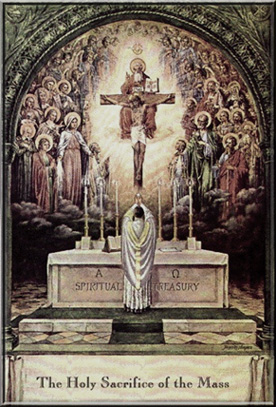 What, then, dear Christians, may you not expect through the Mass when offered up for your intention? For, in every such Mass, Jesus Christ earnestly implores for you all that you desire from His Eternal Father. Jesus and the Eternal Father are one; therefore in the Mass, and through the Mass, you are sure to obtain all that you rightly ask for, and much more in addition. "Assuredly," says St. Jerome, "the Lord grants all the favors for which we petition Him in the Mass, provided they be suitable to us; and what is far more admirable, He very often grants us that for which we do not petition Him, always provided that we place no obstacles to His holy designs." St. Bernard, speaking of the intrinsic value of the Mass, says, that "more is gained by one single Mass than by distributing all your substance among the poor, or going on pilgrimages to all the most venerable sanctuaries on this globe." St. Thomas, the Angelic Doctor, states that "the Holy Mass contains all those fruits, all those graces, nay, all those infinite treasures which the Son of God showered so abundantly upon His Church, in the bloody Sacrifice of the Cross."
What, then, dear Christians, may you not expect through the Mass when offered up for your intention? For, in every such Mass, Jesus Christ earnestly implores for you all that you desire from His Eternal Father. Jesus and the Eternal Father are one; therefore in the Mass, and through the Mass, you are sure to obtain all that you rightly ask for, and much more in addition. "Assuredly," says St. Jerome, "the Lord grants all the favors for which we petition Him in the Mass, provided they be suitable to us; and what is far more admirable, He very often grants us that for which we do not petition Him, always provided that we place no obstacles to His holy designs." St. Bernard, speaking of the intrinsic value of the Mass, says, that "more is gained by one single Mass than by distributing all your substance among the poor, or going on pilgrimages to all the most venerable sanctuaries on this globe." St. Thomas, the Angelic Doctor, states that "the Holy Mass contains all those fruits, all those graces, nay, all those infinite treasures which the Son of God showered so abundantly upon His Church, in the bloody Sacrifice of the Cross."Since Almighty God has, then, vouchsafed to give us the Holy Sacrifice of the Mass, He has, with it, given us the means to obtain all good things. By offering up a Mass, or by causing it to be offered for you, my brethren, it may be said that, in a certain sense, you make God your debtor. For, in that "clean oblation of the altar," you lovingly offer Jesus Christ to His Eternal Father in sacrifice; and thereby you make Almighty God an infinite offering, in return for the finite creatures He bestows upon you from His bounty, for your use and benefit. Let us, then, my brethren, in all our undertakings, make an offering of the Mass to God, and ask Him in that Holy Sacrifice for all such favors, great or small, as we may need or desire. He cannot easily refuse us, for it is the transcendent nature of God not to be outdone by us, His creatures, in kindness or in generosity. We seek for many graces at the hands of God. We stand in need of many blessings. Let us offer up the Mass to obtain them. Let us offer it up to obtain the full forgiveness of our manifold sins, both known and unknown. Let us offer up the Mass to obtain the conversion of all poor sinners. Let us offer it up to obtain protection from the many temptations of Satan. Let us offer it up, too, for all temporal things, such as good health of body and mind, and success in our lawful business. Let us offer up Masses for the sick and the dying that they may obtain the grace of a happy death. And, furthermore, let us frequently offer up the sublime Sacrifice of the Altar for all the souls suffering in Purgatory, especially for those imprisoned therein through our fault, whether friends or otherwise, that they may be speedily released from their pains, and joyfully admitted into the presence of God in heaven. My brethren, frequently assist at the Holy Mass. Remember there is no half hour so well spent, as the half hour devoted to attendance at this Holy Sacrifice. You know, of course, that the laity assisting at Mass, offer the Sacrifice in union with the priest. Hence, the latter says at that holy time, Orate fratres, etc.. "Pray, brethren, that my and your sacrifice may be pleasing in the sight of God the Father Omnipotent." At Mass the people should, as it were, hold up the hands of the priest when he takes the consecrated host and the chalice and offers the great Sacrifice. Great blessings descend upon those who join with the priest in devoutly offering up this great sacrifice. No one should be stopping outside the church during time of Mass. St. Gregory says: "A well-disposed man who hears Holy Mass with due attention, is preserved in the way of rectitude, while grace and merit increase in him; and he continues to make new acquisitions of virtue which render him more and more acceptable to God." "Whoever hears Mass devoutly every day," says St. Augustine, "shall be preserved from a sudden death, which is the most awful weapon with which Divine Justice punishes the sinner." But, my brethren, listen to the sublime language of St. Leonard of Port Maurice on this subject: "Would that I could ascend," says he, "to the summit of the loftiest mountain, and cry aloud, so that the whole world might hear me exclaiming: 'Foolish, foolish people, what are ye doing? Why will you not hasten to the churches to assist at every Mass celebrated therein? Why will you not imitate those holy Angels who, according to St. John Chrysostom, descend in thousands from the heavens, when Mass is being celebrated, and array themselves before our altars, covered with wings of holy awe, tarrying there during the august sacrifice, in order to intercede more efficaciously for us, knowing well that this is the most opportune time and most propitious occasion that can be, for obtaining favors from heaven?"' (Hid. Treasure). And St. Leonard, furthermore, adds the following very emphatic words--(they are the burning words of a saint): --" Let me, on bended knees," he says, "and with hands uplifted, implore all who read this little work on the Sacrifice of the Mass not to close it till they have made a firm resolution of henceforth employing all possible diligence in assisting at Mass, and causing to be celebrated as many Masses as their means will permit, not only for the souls of the deceased, but, also, for their own souls!" ( By a special rule of this Order, St. Leonard was not allowed to accept any money for "saying" Mass. . If the whole globe were of solid gold, it would not be a suflicient price for a Mass.) Oh! my brethren, let us thank Almighty God a thousand times for His unspeakable love toward us in having given to us in the Church the rich treasure of the Mass! Let us ask Mary, the Crowned Queen of Heaven, to thank our Blessed Lord and God, again and again, for His love for us, individually, in thus, also, having made known to us the hidden riches of this adorable Sacrifice, and the untold benefits we may derive from it, both for time and for eternity! It is a precious mine of exhaustless wealth, a treasury of grace, a perennial fountain of blessings; it is the sun and centre of the whole system of true religion; it is the heavenly focus--inexpressibly loved and lovely--in which are concentrated all the soul-saving rays of God's beauty and royal splendor, of His glory and Majesty and Divinity. The Mass is the miracle of miracles-- it is the mystery of God's deep, boundless, and burning love for man!-- "Having loved His own, who were in the world," says St. John the Evangelist, "He loved them to the end " (John xiii. I). Amen. http://catholicharboroffaithandmorals.com/ |